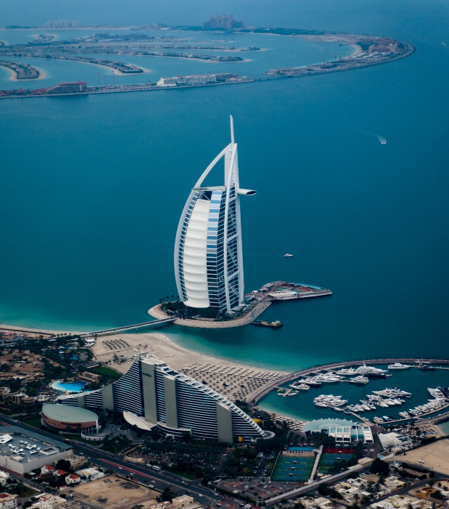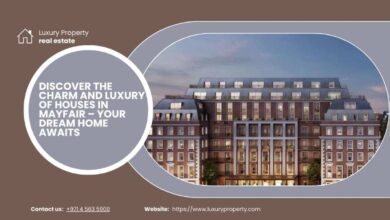Dubai, the shining pearl of the United Arab Emirates, is well-known for its spectacular skyline, opulent way of life, and unrivalled economic progress. The rising real estate industry is one of the factors that has contributed to this astonishing shift.
Dubai has drawn the interest of investors, developers, and homeowners from all over the world with its blend of architectural marvels, forward-thinking urban design, and a growing economy.
This article delves into the real estate market in Dubai, examining the driving forces behind its development, the major players, and the trends that are still reshaping the industry.

The Development of Dubai’s Real Estate Industry
Real estate in Dubai has experienced an extraordinary transformation. The city, which started as a tiny trading port, has grown into a global metropolis with some of the world’s most recognizable buildings. The opening of construction sites for the Burj Khalifa and the Palm Jumeirah marked a turning point for Dubai’s real estate market. These audacious projects demonstrated Dubai’s dedication to breaking barriers and reinventing luxury living.
Real Estate Industry Leaders in Dubai
Several well-known real estate firms have significantly shaped Dubai’s landscape:
- Emaar Properties: Possibly the most well-known company, Emaar is in charge of many projects that have improved the reputation of Dubai on a global scale, such as the Dubai Mall and the Burj Khalifa.
- Nakheel: Nakheel is renowned for innovative projects like the Palm Jumeirah and the World Islands, which have altered Dubai’s shoreline.
- Dubai Properties: They have made a significant contribution to the urban development of Dubai with its wide portfolio of residential, commercial, and mixed-use buildings.
- Damac Properties: With a focus on luxury living, Damac has developed lavish homes and resorts that appeal to affluent consumers.
- Meraas: has built places like City Walk and Bluewaters Island with a focus on developing distinctive lifestyle experiences.
Market-Driving Factors
Dubai’s real estate market has grown as a result of several factors:
- Important Geography:As a crossroads of the world, Dubai’s location has attracted foreign firms and investors.
- Business-Friendly Regulations: Foreign investments have been encouraged by Dubai’s investor-friendly regulations, which include tax advantages and ownership privileges.
- Tourist and Expo 2020:The booming tourism sector in Dubai, along with occasions like Expo 2020, has increased demand for lodging and residential properties.
- High-net-worth:Individuals looking for unique houses have been drawn to the city by its reputation for luxury living.
Investing Possibilities
- Residential Property: Towering residential buildings, expansive gated communities, and magnificent villas grace Dubai’s skyline. The diversified population of the city needs a variety of housing alternatives, from opulent penthouses to comfortable homes for families. The desire for homes that prioritize communal life, security, and contemporary conveniences has increased with the emergence of nuclear families and expatriates looking for long-term residency.
- Hospitality and vacations: Dubai’s hospitality industry thrives as a major hub for travel worldwide. The city’s upscale hotels, resorts, and entertainment hubs serve a wide range of patrons. The impending Expo 2020 event is anticipated to increase demand for lodging and commercial space, offering profitable investment opportunities in the industry.
- 3. Industrial Spaces: Due to real estate company in Dubai, there is a high demand of spaces and property. The city appeals to both global enterprises and start-ups due to its advantageous location, business-friendly laws, and first-rate infrastructure.
- Shopping: Dubai’s retail industry is thriving, with malls and shopping centres showcasing a variety of worldwide brands, leisure activities, and food alternatives. A trend toward experiential retail is rising as consumer preferences change, providing chances for creative retail ideas that combine entertainment, leisure, and shopping.
Challenges and Things to Think About
1. Market overabundance: In recent years, there has been an oversupply of certain property types on the real estate market, which could pose problems for rental yields and the stability of property values. To create a balanced market, developers are being more careful in their strategy.
2.Economic Risk: Although Dubai’s economy is still strong, volatility in the global economy might affect investor mood. To lessen these difficulties, the city is working to diversify its economy beyond the oil and gas industry and to boost industries like technology, banking, and tourism.
3.Regulatory Adjustments: To improve transparency, safeguard investor rights, and promote sustainable growth, Dubai’s real estate laws are being updated. To make wise selections, investors must be updated about these changes.
4.Long-Term Objective: Dubai’s innovative urban planning has molded the city’s real estate market. Even if some initiatives take time to complete, they all support the city’s long-term growth plan.
Modern Trends
- Sustainable Living: Dubai is putting more of an emphasis on sustainable practices, including eco-friendly building designs.
- Smart Cities: The idea of smart cities, which incorporate cutting-edge technologies for better urban living, is gaining traction.
- Community Living: New construction emphasizes designs that are centred on the community and provide common areas, amenities, and recreational facilities.Co-living and co-working spaces are in demand as a result of the increase in remote employment, creating new real estate opportunities.
Issues and the Prognosis
Dubai’s real estate market still confronts difficulties despite its impressive expansion, including oversupply in some industries and unpredictable economic conditions. But the government’s proactive actions, like the creation of new industries and long-term visas, show a dedication to maintaining the market’s expansion.
Conclusion
In conclusion, Dubai’s real estate market is proof of the city’s bold goals and will to establish itself as a center of luxury, innovation, and economic development. Dubai continues to be an intriguing case study of how real estate can influence a city’s future as iconic towers continue to pierce the skyline and ground-breaking developments revolutionize urban living. The real estate market in Dubai continues to draw attention from all over the world, whether it is due to the breathtaking buildings or the well-planned communities.







